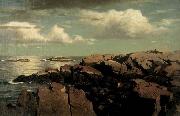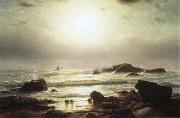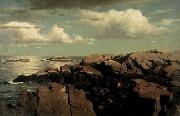William Stanley Haseltine Huiler la Reproduction de TableauAll William Stanley Haseltine Oil Paintings(June 11, 1835-February 3, 1900) was an American painter and draftsman who was associated with the Hudson River School and Luminism. Born in Philadelphia to John Haseltine, a successful businessman, and Elizabeth Shinn Haseltine, an amateur landscape painter, Haseltine studied at the University of Pennsylvania and then at Harvard University, where he received a degree in 1854. He first exhibited his paintings the following year at the Pennsylvania Academy of Fine Arts, after which he sailed to Europe, first joining a colony of American painters who were studying in Dusseldorf, then traveling up the Rhine into Switzerland and Italy. In late 1857 he settled in Rome, and in the following months made numerous excursions to draw the landscape around Rome and on Capri. In 1858 Haseltine returned to Philadelphia, and by late 1859 was installed in the Tenth Street Studio Building in New York City, then a central point for American landscape painters; also in the building were Frederic Edwin Church, Albert Bierstadt, and Worthington Whittredge, the latter two having befriended Haseltine in Europe. Though many of his paintings from this time derived from his European sketches, Haseltine also began to paint the oceanside of New England, especially favoring the rockbound coasts of Narragansett, Rhode Island, Nahant, Massachusetts, and Mount Desert Island, Maine. The precision with which he painted these landscapes won critical praise, and Haseltine was elected an Associate of the National Academy of Design in 1860, and a full Academician in 1861. In 1864 Haseltine's wife died in childbirth. He spent some time training his nephew, Howard Russell Butler, but he moved after he married Helen Marshall in 1866. Initially the family considered settling in Paris, but in 1867 they moved to Rome, which would for most of Haseltine's subsequent years serve as his home and point of departure from which to produce views of the European landscape. While his paintings of Capri and Sicily would prove popular with visiting American tourists, Haseltine also traveled and drew in France, Holland, Belgium, and the Netherlands, summering in Bavaria and the Tyrol in the 1880s and 1890s. In his later years he also returned periodically to the United States, making a final trip to the west in 1899. Haseltine died of pneumonia in Rome in 1900. |
|||

|
|||
|
|
|||
|
||||||||||||
| William Stanley Haseltine (June 11, 1835-February 3, 1900) was an American painter and draftsman who was associated with the Hudson River School and Luminism. Born in Philadelphia to John Haseltine, a successful businessman, and Elizabeth Shinn Haseltine, an amateur landscape painter, Haseltine studied at the University of Pennsylvania and then at Harvard University, where he received a degree in 1854. He first exhibited his paintings the following year at the Pennsylvania Academy of Fine Arts, after which he sailed to Europe, first joining a colony of American painters who were studying in Dusseldorf, then traveling up the Rhine into Switzerland and Italy. In late 1857 he settled in Rome, and in the following months made numerous excursions to draw the landscape around Rome and on Capri. In 1858 Haseltine returned to Philadelphia, and by late 1859 was installed in the Tenth Street Studio Building in New York City, then a central point for American landscape painters; also in the building were Frederic Edwin Church, Albert Bierstadt, and Worthington Whittredge, the latter two having befriended Haseltine in Europe. Though many of his paintings from this time derived from his European sketches, Haseltine also began to paint the oceanside of New England, especially favoring the rockbound coasts of Narragansett, Rhode Island, Nahant, Massachusetts, and Mount Desert Island, Maine. The precision with which he painted these landscapes won critical praise, and Haseltine was elected an Associate of the National Academy of Design in 1860, and a full Academician in 1861. In 1864 Haseltine's wife died in childbirth. He spent some time training his nephew, Howard Russell Butler, but he moved after he married Helen Marshall in 1866. Initially the family considered settling in Paris, but in 1867 they moved to Rome, which would for most of Haseltine's subsequent years serve as his home and point of departure from which to produce views of the European landscape. While his paintings of Capri and Sicily would prove popular with visiting American tourists, Haseltine also traveled and drew in France, Holland, Belgium, and the Netherlands, summering in Bavaria and the Tyrol in the 1880s and 1890s. In his later years he also returned periodically to the United States, making a final trip to the west in 1899. Haseltine died of pneumonia in Rome in 1900. |
||||||||||||
|
|
||||||||||||
| ID de tableau:: 71438 After a Shower -- Nahant, Massachusetts After a Shower -- Nahant, Massachusetts ca. 1864(1864) Oil on canvas 37.8 x 58.3 cm (14.88 x 22.95 in) ca. 1864(1864) Oil on canvas 37.8 x 58.3 cm (14.88 x 22.95 in) |
||||||||||||
|
|
||||||||||||
| ID de tableau:: 71468 Rocks at Nahant Rocks at Nahant ca. 1864(1864) Oil on canvas 56 x 101.9 cm (22.05 x 40.12 in) ca. 1864(1864) Oil on canvas 56 x 101.9 cm (22.05 x 40.12 in) |
||||||||||||
|
|
||||||||||||
| ID de tableau:: 71677 Sail Boats Off a Rocky Coast Sail Boats Off a Rocky Coast ca. 1864(1864) Oil on canvas 60.7 x 91.8 cm (23.9 x 36.14 in) ca. 1864(1864) Oil on canvas 60.7 x 91.8 cm (23.9 x 36.14 in) |
||||||||||||
|
|
||||||||||||
| ID de tableau:: 72574 Massachusetts Massachusetts Date ca. 1864(1864) Medium Oil on canvas Dimensions 37.8 X 58.3 cm (14.88 X 22.95 in) cyf Date ca. 1864(1864) Medium Oil on canvas Dimensions 37.8 X 58.3 cm (14.88 X 22.95 in) cyf |
||||||||||||
|
|
||||||||||||
| ID de tableau:: 72637 Rocks at Nahant Rocks at Nahant Date ca. 1864(1864) Medium Oil on canvas Dimensions 56 X 101.9 cm (22.05 X 40.12 in) cyf Date ca. 1864(1864) Medium Oil on canvas Dimensions 56 X 101.9 cm (22.05 X 40.12 in) cyf |
||||||||||||
|
|
||||||||||||
| Artiste précédent Artiste prochain | ||||||||||||
|
|
||||||||||||
|
William Stanley Haseltine (June 11, 1835-February 3, 1900) was an American painter and draftsman who was associated with the Hudson River School and Luminism. Born in Philadelphia to John Haseltine, a successful businessman, and Elizabeth Shinn Haseltine, an amateur landscape painter, Haseltine studied at the University of Pennsylvania and then at Harvard University, where he received a degree in 1854. He first exhibited his paintings the following year at the Pennsylvania Academy of Fine Arts, after which he sailed to Europe, first joining a colony of American painters who were studying in Dusseldorf, then traveling up the Rhine into Switzerland and Italy. In late 1857 he settled in Rome, and in the following months made numerous excursions to draw the landscape around Rome and on Capri. In 1858 Haseltine returned to Philadelphia, and by late 1859 was installed in the Tenth Street Studio Building in New York City, then a central point for American landscape painters; also in the building were Frederic Edwin Church, Albert Bierstadt, and Worthington Whittredge, the latter two having befriended Haseltine in Europe. Though many of his paintings from this time derived from his European sketches, Haseltine also began to paint the oceanside of New England, especially favoring the rockbound coasts of Narragansett, Rhode Island, Nahant, Massachusetts, and Mount Desert Island, Maine. The precision with which he painted these landscapes won critical praise, and Haseltine was elected an Associate of the National Academy of Design in 1860, and a full Academician in 1861. In 1864 Haseltine's wife died in childbirth. He spent some time training his nephew, Howard Russell Butler, but he moved after he married Helen Marshall in 1866. Initially the family considered settling in Paris, but in 1867 they moved to Rome, which would for most of Haseltine's subsequent years serve as his home and point of departure from which to produce views of the European landscape. While his paintings of Capri and Sicily would prove popular with visiting American tourists, Haseltine also traveled and drew in France, Holland, Belgium, and the Netherlands, summering in Bavaria and the Tyrol in the 1880s and 1890s. In his later years he also returned periodically to the United States, making a final trip to the west in 1899. Haseltine died of pneumonia in Rome in 1900. |
||||||||||||
|
|
||||||||||||
|
CONTACTER DES Etats-Unis |










